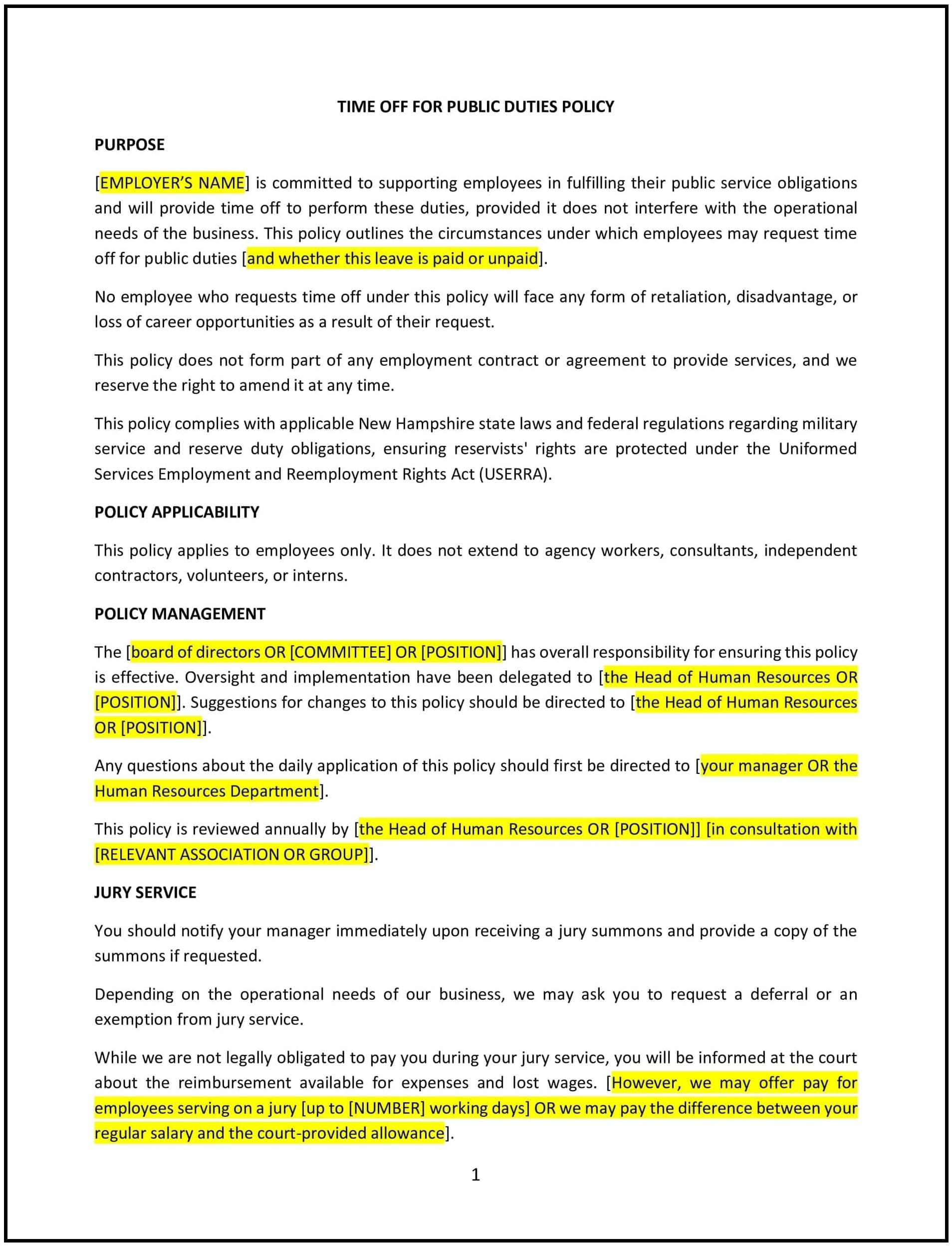Time off for public duties policy (New Hampshire): Free template
Got contracts to review? While you're here for policies, let Cobrief make contract review effortless—start your free review now.

Customize this template for free
Time off for public duties policy (New Hampshire)
A time off for public duties policy helps New Hampshire businesses outline the conditions under which employees can take time off to fulfill public service responsibilities, such as jury duty, voting, or serving as an elected official. This policy sets clear expectations regarding the process for requesting time off, the length of leave allowed, and how such time off will affect compensation.
By implementing this policy, businesses can support employees’ civic responsibilities while maintaining business operations and ensuring fairness for all employees.
How to use this time off for public duties policy (New Hampshire)
- Define public duties: Specify the types of public duties for which employees may be eligible for time off, such as jury duty, voting, serving as a witness, or participating in government-related activities.
- Outline eligibility: Clarify which employees are eligible for public duties leave, including any specific criteria such as length of employment or employment status (full-time, part-time).
- Establish the request process: Define how employees should request time off for public duties, including any required notice periods, documentation (e.g., court summons), and how far in advance the request should be made.
- Address compensation: Clarify whether employees will be paid during their time off for public duties, whether the leave will be paid or unpaid, or if the employee will be reimbursed for any wages lost during the time off.
- Specify leave duration: Indicate how much time off is allowed for public duties, whether it is a set number of days or based on the duration of the service.
- Set expectations for communication: Outline how employees should stay in communication with the business during their leave, including notifying the company if their public duty responsibilities change.
- Consider partial leave: If the employee’s public duty only requires partial time away from work, specify whether employees can return to work after completing part of the duty.
- Provide support for essential services: If public duties leave impacts business operations, address how critical tasks will be covered and outline any support offered to employees returning from such leave.
- Review and update: Periodically review and update the policy to ensure it remains aligned with legal requirements and company needs.
Benefits of using this time off for public duties policy (New Hampshire)
This policy provides several benefits for New Hampshire businesses:
- Promotes civic responsibility: By providing time off for public duties, businesses contribute to their employees’ ability to participate in civic duties and serve the community.
- Ensures fairness: A clear policy helps ensure that all employees are treated fairly when requesting time off for public duties and are not penalized for fulfilling their responsibilities.
- Maintains business operations: By setting expectations for requesting time off and covering duties, businesses can manage staffing needs and minimize disruptions.
- Enhances employee satisfaction: Employees who feel supported in fulfilling civic duties are more likely to be satisfied with their work environment and feel valued by their employer.
- Protects against legal issues: A clearly communicated policy helps businesses comply with relevant laws regarding time off for public duties, reducing the risk of legal disputes.
Tips for using this time off for public duties policy (New Hampshire)
- Communicate the policy clearly: Make sure all employees are aware of the policy and understand how to request time off for public duties and any conditions attached to the leave.
- Be flexible: While maintaining business operations, be flexible in accommodating employees’ needs for time off to fulfill their civic duties.
- Offer support for staffing: If public duties leave causes a temporary shortage in staffing, consider cross-training employees or establishing backup plans to ensure business continuity.
- Stay informed about legal updates: Ensure that the policy is updated in line with any changes to state or federal laws related to public duties leave.
- Document requests: Keep detailed records of time-off requests, including the dates, duration, and type of public duty, to ensure transparency and accountability.